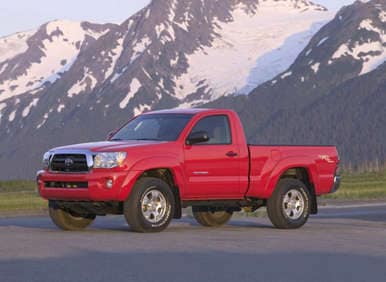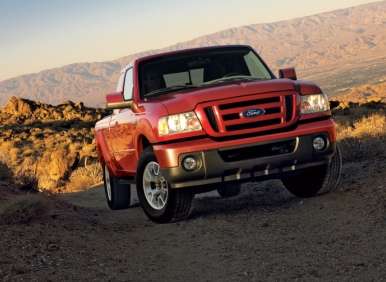Recent Articles
Popular Makes
Body Types
Going By the Numbers: the Most Fuel Efficient Trucks

Fuel efficiency is becoming one of the most important factors in purchasing a new vehicle, especially in pickup trucks. As fuel prices rise, the fuel-hungry trucks traditionally see their sales plummet.
There is still some good news in today's truck market. Most pickup trucks are as efficient or sometimes even more efficient than in previous years. For example, a four-cylinder 2011 Toyota Tacoma with automatic transmission is rated by the EPA at 19/25 mpg city/highway. Back in 2001, this same model was rated at 19/22 mpg, and in 1991, the comparable truck was still 19/22 mpg city/highway.
Trucks are also more efficient further up in the scale in the full-size segment. The most efficient V-8 in the 2011 Ford F-150 is rated at 15/21 mpg city/highway. In 2001 the F-150's best V-8 was returning 14/19 mpg, and 13/17 city/highway in 1991. The Ford F-150 now also has the new V-6 EcoBoost engine that has better fuel economy than the V-8 while churning out more power and torque.
But being able to get historically better fuel economy than its predecessors is not enough to fully ease the pain in the consumer's wallet. So for those who need to know which trucks cost the least amount of cash at the pump, we are going to look at pickups in each segment that return the best fuel economy.
Small and Mid-size Trucks
Small and mid-size trucks are combined into one category because the line has been significantly blurred in these classes. For example, the 2011 Toyota Tacoma comes standard as one of the shortest trucks in North America at about 190 inches. Tick enough option boxes, and the Tacoma can grow to be one of largest in the class at over two and a half feet longer.
This category is spread out along a diverse size of powertrains that range from the 2.3-liter four-cylinder engine in the Ford Ranger to the 5.3-liter V-8 available in the Chevrolet Colorado/GMC Canyon twins. Because of all the powerplant choices, it is best to take a look at the greatest mileage in both the basic small trucks with four-cylinder engine, as well as those with upgraded engines (5, 6, and 8 cylinders). The most fuel efficient small/mid-size trucks are as follows:
• Rear-wheel drive, five-speed manual transmission: Ford Ranger 2.3-liter 22/27 mpg city/highway • Rear-wheel drive, automatic transmission: Toyota Tacoma 2.7-liter 19/25 mpg city/highway (the Chevrolet Colorado/GMC Canyon and Ford Ranger come close with 18/25 and 19/24 mpg respectively) • Four-wheel drive, five-speed manual transmission: Chevrolet Colorado/GMC Canyon 2.9-liter 18/24 mpg city/highway • Four-wheel drive, automatic transmission: Chevrolet Colorado/GMC Canyon 2.9-liter 17/23 mpg city/highway
• Rear-wheel drive, five-speed manual transmission: Ford Ranger 4.0-liter V-6 16/21 mpg city/highway • Rear-wheel drive, automatic transmission: Chevrolet Colorado/GMC Canyon 3.7-liter five-cylinder 17/23 mpg city/highway • Four-wheel drive, six-speed manual transmission: Nissan Frontier 4.0-liter V-6 15/20 mpg city/highway (Ford Ranger 4.0-liter V-6 comes close at 15/19 mpg) • Four-wheel drive, automatic transmission Chevrolet Colorado/GMC Canyon 3.7-liter five-cylinder 17/23 mpg city/highway

Full-size Trucks
Once again listings are broken up by transaxle type because the added weight of a 4x4 can take away from fuel economy. Engine categories include the standard (i.e. non-turbo) V-6 engine, which is still available over a small range of full-size trucks. There is also a category for upgraded engines. These are mostly V-8s, but the F-150's EcoBoost V-6 is added to this category because its power and price tag rival V-8 trucks. All are only rated with automatic transmissions because manuals are rare in this category. The most fuel efficient full-size trucks are as follows:
- Rear-wheel drive: Ford F-150 3.7-liter V-6 17/23 mpg city/highway
- Four-wheel drive: Ford F-150 3.7-liter V-6 16/21 mpg city/highway
- Rear-wheel drive: Ford F-150 EcoBoost 3.5-liter turbo V-6 16/22 mpg city/highway
- Four-wheel drive: (tie) Ford F-150 EcoBoost 3.5-liter turbo V-6 and Chevrolet Silverado/GMC Sierra 5.3-liter V-8 15/21 mpg city/highway
There is one full-size truck of note that was left out of the assessment in this category. The Chevrolet Silverado/GMC Sierra hybrid is rated at 20/23 mpg city/highway for both rear-wheel and four-wheel drive, which gives it the best fuel economy of any full-size truck. The Chevy/GMC hybrid twins were excluded because the 2011 Silverado hybrid's starting price of $38,725 ($39,095 for the Sierra) is over $11k more than the base price of its nearest mileage competitor, the F-150 EcoBoost. GM's hybrid trucks come with plenty of standard features, including crew cab body style, but it was too exclusive to run with the rest in this assessment.

Heavy Duty Consumer Trucks
Heavy duty pickups are hard to accurately measure because the EPA does not currently require testing in this segment of trucks. Still, there is some information out there that can help understand how much fuel these large pickups consume.
Only the domestic automakers compete in this segment with the (Dodge) Ram 2500/3500, Chevrolet Silverado/GMC Sierra 2500/3500, and the Ford F-250/F-350. All of these trucks are available with a gasoline engine or a diesel unit (except the Ram 3500, which is diesel only.)
The gas engines in the Ram and Ford trucks are derived from the largest capacity V-8s in their full-size lineup. Ram advertises the 5.7-liter V-8 in the Ram 2500 gets 14/20 mpg city/highway. This is the same figure the EPA rates this engine for the lighter 1500 series Ram truck, so actual fuel mileage in the 700 lbs heavier Ram 2500 is likely somewhat less.
Ford is the only company of the three that has released data directly analyzing fuel economy in heavy duty consumer pickups. Ford ran a test using its own chosen closed loop circuit to measure the mileage of the gas engined F-250, Ram 2500, and Silverado 2500. In this comparison, the Ford returned about 17 mpg, and the Ram and Chevy returned about 16 mpg. Ford also ran its diesel engined F-350 against a diesel Silverado 3500 (Ram's new High Output diesel was not available for testing.) The Ford returned about 19.2 mpg, and the Chevy returned about 17.5 mpg. It is important to remember that since Ford chose the testing circuit, it would be the likely victor in these comparisons. Still, neither Ram nor GM has yet to make significant noise refuting Ford's claims.

IMPORTANT NOTES
The focus of this assessment was on the fuel economy leaders in comparable truck categories. This article does not take into consideration horsepower and torque advantages one truck may have over another. For example, the 3.5-liter EcoBoost engine in the Ford F-150 and the 5.3-liter V-8 in the Chevrolet Silverado/GMC Sierra are rated the same mileage in 4x4 trucks. This article did not the discriminate against the 50 hp and 82 lb-ft of torque disadvantage in the GM trucks.
A final important element to remember is how much the extra fuel mileage is really saving you. For example, someone who drives 15,000 miles per year at an average of $4.00 per gallon will see an annual difference of $143 between achieving 20 mpg and 21 mpg. So remember to do the math on how much a difference in miles per gallon will equal in annual savings. Because it is worth knowing how long it will take for an extra investment in fuel economy to pay off.
